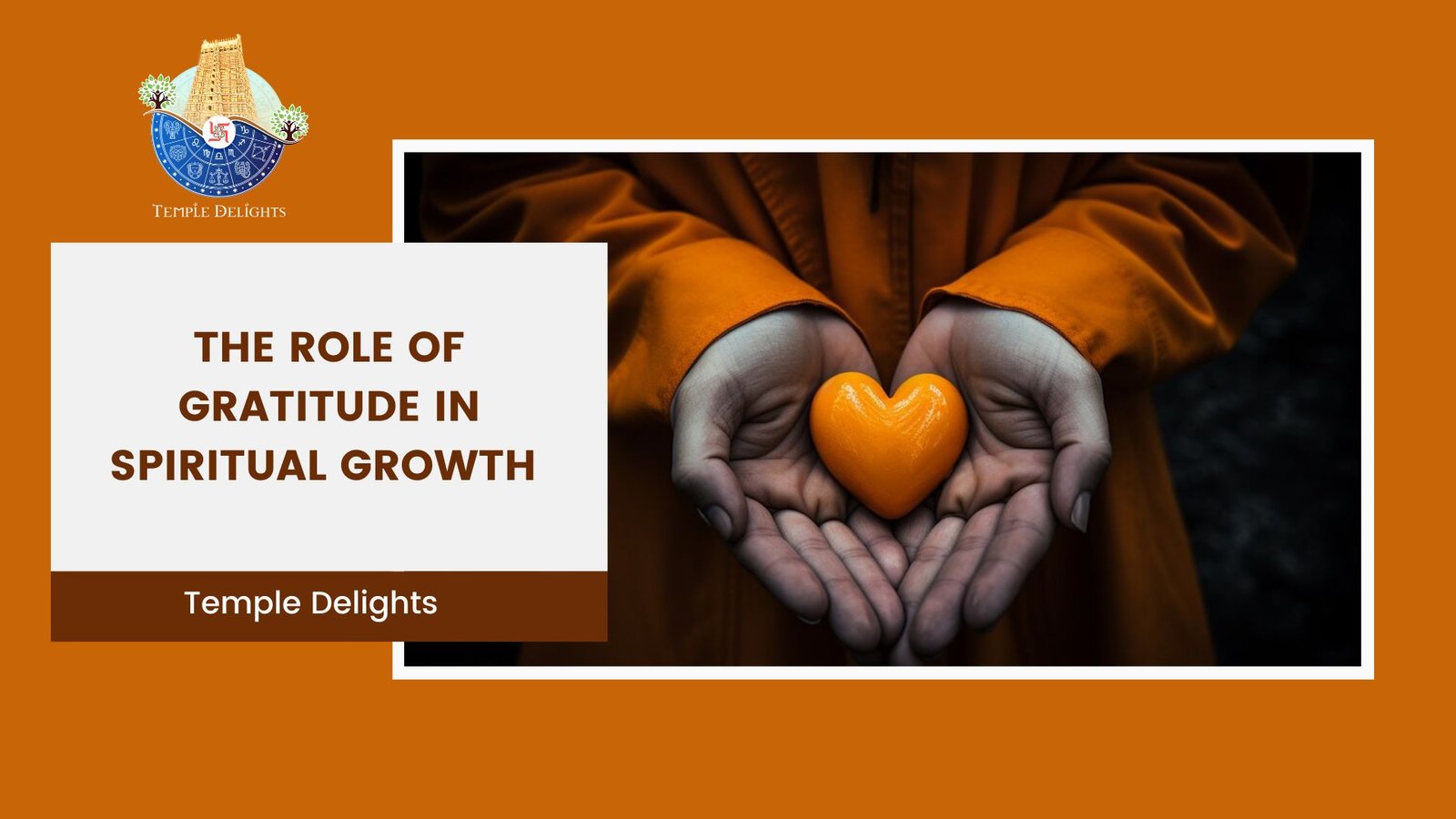Blogs
The Role of Gratitude in Spiritual Growth: How Practicing Gratitude Can Lead to a More Fulfilling and Spiritually Enriched Life
Introduction:
In the hustle and bustle of modern life, it’s easy to lose sight of the simple, yet profound practice of gratitude. More than just a fleeting feeling or polite “thank you,” gratitude is a powerful force that can transform your spiritual journey, leading to a more fulfilling and enriched life. This blog delves into the role of gratitude in spiritual growth, exploring how this practice can open doors to deeper connections, inner peace, and profound joy.

Understanding Gratitude
Gratitude is more than just an emotional response to receiving something positive; it is a deeper state of appreciation that acknowledges the goodness in life, often recognizing that the sources of this goodness lie partially outside ourselves. It involves a sense of wonder, thankfulness, and appreciation for life itself.
Gratitude encourages us to focus on what we have rather than what we lack. This shift in perspective can be a powerful catalyst for spiritual growth, as it aligns us with a higher frequency of positive energy and connects us to the broader flow of life.
In today’s fast-paced world, finding inner peace can seem elusive. The constant demands of work, family, and social obligations can create a whirlwind of stress and anxiety. Yet, amidst this chaos, it is possible to find a sanctuary of calm and tranquility. Cultivating inner peace is a journey that requires intentional practices and a commitment to personal growth. This blog explores various techniques and practices that can help you discover and maintain a state of inner tranquility.
The Spiritual Dimension of Gratitude
From a spiritual perspective, gratitude is often seen as a pathway to a higher state of consciousness. Many spiritual traditions emphasize the importance of gratitude as a core practice. For instance, in Christianity, believers are encouraged to “give thanks in all circumstances” (1 Thessalonians 5:18). In Buddhism, gratitude is linked to mindfulness and the recognition of interdependence. Similarly, Hindu and Native American traditions have long incorporated gratitude rituals to honor the interconnectedness of all life.
Gratitude shifts our focus from our own struggles to the beauty and abundance around us. This shift not only makes us feel better but also aligns us with a higher spiritual plane where we are more attuned to the divine presence in our lives. By fostering a habit of gratitude, we cultivate a sense of reverence for life, enhancing our spiritual practice.
Benefits of Practicing Gratitude for Spiritual Growth
- Enhanced Awareness and Mindfulness
Practicing gratitude encourages us to live in the present moment. It helps us become more aware of our surroundings and the many blessings we often overlook. This heightened state of awareness is a cornerstone of many spiritual practices, such as meditation and prayer. By being more present, we open ourselves to deeper spiritual insights and connections.
- Increased Positivity and Joy
Gratitude has been scientifically proven to increase happiness and reduce stress. When we focus on the positive aspects of our lives, we cultivate a more positive mindset. This not only improves our mental and emotional well-being but also raises our spiritual vibration, making it easier to connect with higher states of consciousness and spiritual guides.
- Strengthened Relationships
Expressing gratitude helps to build and strengthen our relationships. By acknowledging and appreciating the people in our lives, we create a positive feedback loop of kindness and compassion. Strong, loving relationships are often seen as a reflection of our spiritual health, and nurturing them can lead to greater spiritual fulfillment.
- Greater Resilience and Inner Strength
Gratitude helps us develop a resilient spirit. When we are grateful, we are better able to cope with life’s challenges and setbacks. This resilience is crucial for spiritual growth, as it allows us to maintain our faith and trust in the face of adversity. By focusing on the positive, we cultivate a sense of inner strength and fortitude.
- Connection to a Higher Power
Many people find that gratitude deepens their connection to a higher power or the divine. By acknowledging the blessings in our lives, we recognize the presence of a greater force at work. This recognition can enhance our spiritual practice, making our prayers, meditations, and rituals more meaningful and fulfilling.
Practical Ways to Cultivate Gratitude
Incorporating gratitude into your daily life doesn’t have to be complicated. Here are some practical ways to cultivate this powerful practice:
- Gratitude Journaling
One of the most effective ways to practice gratitude is to keep a gratitude journal. Each day, write down three to five things you are grateful for. These can be big or small, from a beautiful sunset to a kind word from a friend. Over time, this practice can help shift your focus from what is lacking to the abundance that already exists in your life.
- Gratitude Meditation
Incorporate gratitude into your meditation practice. Begin or end your meditation by reflecting on the things you are grateful for. Visualize each blessing and let the feeling of gratitude fill your heart. This can help deepen your meditation practice and enhance your spiritual growth.
- Expressing Gratitude to Others
Make it a habit to express your gratitude to others. Whether it’s a heartfelt thank you, a note of appreciation, or a simple act of kindness, letting others know you are grateful for them can strengthen your relationships and create a positive ripple effect.
- Gratitude Rituals
Incorporate gratitude into your spiritual rituals. This could be through prayer, lighting a candle, or creating a gratitude altar. These rituals can serve as a powerful reminder of the blessings in your life and help you stay connected to a higher power.
- Mindful Awareness
Throughout your day, take moments to pause and appreciate the present moment. Whether you’re enjoying a meal, spending time with loved ones, or simply taking a walk, bring your awareness to the blessings around you. This mindfulness practice can enhance your overall sense of gratitude and spiritual fulfillment.
Overcoming Challenges to Gratitude
-
While gratitude is a powerful practice, it is not always easy to maintain, especially during difficult times. Here are some strategies to help you overcome challenges to gratitude:
Acknowledge Negative Emotions
It’s important to acknowledge and process negative emotions rather than suppress them. Allow yourself to feel sadness, anger, or frustration, and then gently bring your focus back to the things you are grateful for. This balanced approach can help you maintain a sense of gratitude even during tough times.
Seek Support
If you find it difficult to practice gratitude, seek support from a spiritual community or a trusted friend. Sharing your struggles and blessings with others can provide a fresh perspective and reinforce your practice.
Practice Self-Compassion
Be kind to yourself and recognize that gratitude is a practice that takes time to develop. If you find yourself struggling, remind yourself that it’s okay to have moments of difficulty. Practicing self-compassion can help you stay committed to your gratitude practice.
Reframe Challenges
Try to reframe challenges as opportunities for growth and learning. While this can be difficult, it can also help you find silver linings in difficult situations and maintain a sense of gratitude.
The Transformative Power of Gratitude
Gratitude is a transformative practice that can profoundly impact your spiritual growth. By fostering a sense of appreciation and wonder, you open yourself to the abundance of life and align with a higher spiritual frequency. Through daily practices such as journaling, meditation, and mindful awareness, you can cultivate gratitude and experience its many benefits.
As you embrace gratitude, you may find that your spiritual journey becomes more fulfilling and enriched. You become more attuned to the present moment, more resilient in the face of challenges, and more connected to a higher power. Ultimately, gratitude can lead to a deeper sense of inner peace, joy, and spiritual fulfillment.
Read This Also: https://templedelights.com/blog/unveiling-the-mysteries-of-the-law-of-attraction-manifest-your-dreams-into-reality/
Conclusion:
In conclusion, the role of gratitude in spiritual growth is profound and multifaceted. By practicing gratitude, you can transform your life, enhance your spiritual practice, and cultivate a deeper connection to the divine. Embrace this powerful practice and watch as your life becomes more fulfilling and spiritually enriched.

